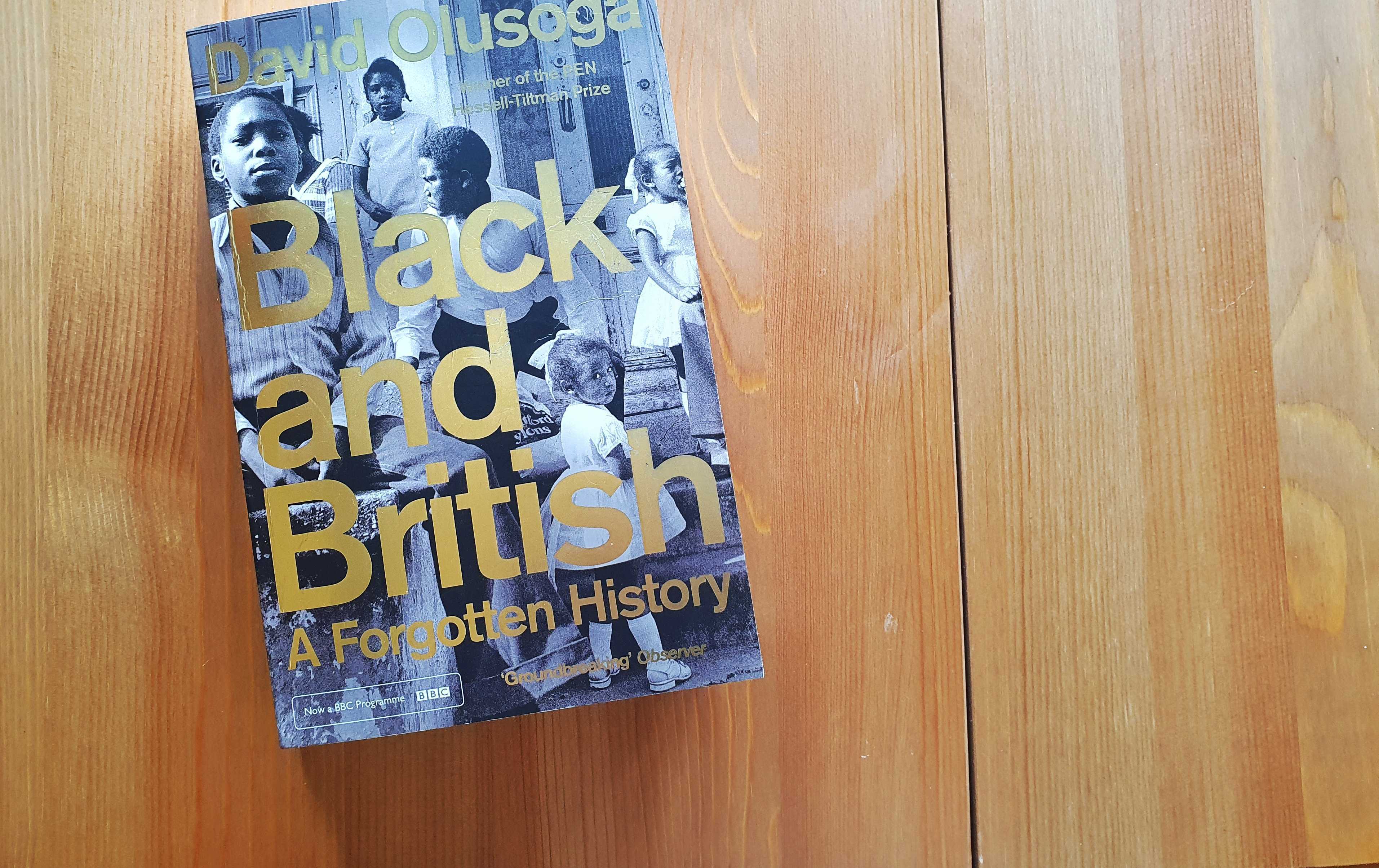Black and British: A Forgotten History by David Olusoga was the first book I was ever going to read about the rich tapestry of black British history – so deeply intertwined with the history we are all taught that it isn't just black history. It's our history. And understanding black history is crucial for people in a modern society who are fighting for justice, or even who simply want to understand the truth.
Yet, despite this, my first reaction was that it looked long. My second reaction was to call out my white-passing privilege – to see learning about race issues or black history as remotely chore-like is a privilege. We need to do the work.
Yet it certainly didn't feel like work. Olusoga's lucid book is a delight to read. His fresh and compassionate prose is utterly absorbing. I went from feeling like I was doing my duty to being unable to resist turning the next page within the first chapter.
But this is almost an aside. By a country mile, what matters most is that this book exposes the careful, deliberate whitewashing of British history and exposes the rich story beneath. A story I didn't know anything about. It exposes the clinical erasure of black contribution, black achievement and the chronic suppression, mistreatment, abuse and murder of black people since the 16th century – and celebrates their achievement and contribution to everything from the arts to activism. It is humbling to begin to learn exactly how much one does not know.
Olusoga takes us all the way from arrival of the first black people in Britain in the 16th century through various eras, each characterised by a different relationship between the British Isles and the black people in Africa and the Caribbean, and a different British social and political climate within which the understanding and position of black people sociological imagination evolved constantly.
The Forgotten History of the British Slave Trade
The determination of British politicians since the middle of the 20th century to expunge all evidence and knowledge of Britain's slave trade and practice of slavery leaves most of us with very little knowledge of Britain's enormous role in the exploitation of black lives. In fact, most of us can picture American slavery more clearly than British slavery.
We learn about how it came to be that half of all of the Africans who were taken captive during the slave trade in the 18th century were transported over the ocean by British ships and the horror they endured which must never be forgotten – and how, against the rise of Christian philanthropy amongst other ideas and movements, a moral fervour against slavery grew on the British Isles leading to an enormous movement of abolitionism spanning all levels of society. Meanwhile, violent rebellions began in the colonies. It finally led to the abolition of the slave trade and slavery respectively in 1808 and 1883, but the role that the enslaved people had in their own emancipation is largely forgotten.
Most fascinating, if not alarming, was learning about the first time that the distinction between "white" and "black" was fleshed out in the middle of the 17th century. It came about when the Barbados Slave Code was drawn up, demarcating "negro" slaves as different from white people in law, which meant a separate law applied, depending on the colour of their skin. In fact, the concept of being "white" was so new that visitors to the island had to have it explained to them. There was no clear language used to describe the distinction before this.
The slave trade shaped the modern world, and its legacy lingers even now, shaping our lives. In fact, the British taxpayer only stopped paying back the enormous debt taken out in the 19th century to "compensate" slave owners for the loss of their "property" in 2015.
Post-Abolition – The Contradiction of Abolition and Racism
Olusoga shows us two sides to what happened between abolition and the World Wars. Yes, Britain did take the lead in ending slavery worldwide. There was a great sense of moral superiority and over the next few decades being anti-slavery became widely thought of as a feature of being British – but the truth was that racist ideas permeated the minds of white British people. That black people were suited to labour. That they were unintelligent. That they did not progress into adulthood in the same way as white people. Anti-slavery did not equate to non-racism. This was the other reality of post-abolition Britain. By the second half of the century, despite widespread celebration and knowledge of the achievements and fame of black people, racial attitudes were hardening and sympathy for black people was dwindling, fuelled by the importation of American racism and Social Darwinism, which was used to argue that black people were suited to servitude. Meanwhile not only was effort was made to help the newly liberated former slaves build new lives for themselves but white commanders oversaw violence and murder against black people.
He also highlights the hypocrisy of the Industrial Revolution. Our memory of this time – a proud history of coal, iron and cotton – misses out the central aspect of the Revolution – the complete dependence of this period on American slavery. Enslaved black people spent their entire lives producing the cotton that fuelled the Revolution.
When European nations carved up the African continent during the Scramble for Africa, one in three African people became British subjects. Ultimately the Scramble was unprofitable – but the greatest impact was the cultural shift. Brits were fascinated by the exoticism of black Africans. Stereotypes and judgements about black people as primitive savages swirled and white supremacy blossomed. Black people were even transported to Britain and forced to perform their daily lives in custom-built "villages" in exhibitions lasting months, where people would flock to watch Africans go about their "typical" routines and were treated as little more than human exhibits.
Racial attitudes towards black people all the way into the 21st century are predicated upon the centuries of rapidly evolving racist ideology that have come before – so deeply rooted in each of us today that only a concerted effort over the course of our lives can hope to uproot them.
The World Wars and Beyond
Olusoga demonstrates how a very deliberately anti-black system, anti-black policy and the whitewashing of history became rife after the beginning of the First World War. Politicians during the war and after went to great pains to exclude black people from service, systematically remove their achievements from record, remove them from Britain and prevent their entry, and plot to portray black people as lazy and immoral. Violent acts of racism by the masses and abuse by the police are forgotten by our history books.
Black names were omitted from the columns past which troops marched at the Victory Parade, which West Indian or African troops were not permitted to take part in. The press described black people as "savages" and the first ever state-sanctioned race discrimination came about in 1920, where black seamen in Britain were forced to register with the police and prove their nationality, or else be issued with an "Aliens Card", making deportation far easier. Between the wars, black people were driven from their homes and lynched by enormous mobs of racist white people who felt black people were, for example, endangering white women or taking their jobs. But this history is never taught.
Numerous attempts were made to prevent the arrival of the Empire Windrush, a ship full of people from the West Indies determined to exercise their right to enter their "mother country". In the 1950s, Churchill asked government officials to find ways to keep West Indians out despite their right to enter. Successive governments tried to find evidence to justify preventing West Indians from entering the country, and plotted to portray black people as lazy and immoral. Attitudes to immigration changed and anti-black policies were election-winners. In 1964, I was appalled to read, the (successful) candidate Conservative MP for Smethwick campaigned under the slogan "If you want a n***** for a neighbour vote Labour". Yes, you read that right.
Racism didn't end with slavery. It didn't end a century ago. It didn't end in the 1980s, when the Met police launched racist campaigns against black people. To believe that racism is all but gone is a myth that it is dangerous to believe – and it is black people who will bear the brunt of our ignorance, yet again. History cannot be allowed to carry on repeating itself.
A duty to learn
This doesn't scratch the surface. I've only shared with you a few of the things that stuck in the front of my mind – there is so much more to uncover in this book alone, not to mention beyond. Triumphs of black people which changed the course of history, great achievements of Africans and West Indians across three continents, but also great tragedies and abuse and loss of black life in numbers the human brain isn't wired to understand. Yet we must try.
All white and white-passing people should learn black history. In fact, black history cannot be separated from "history" – it's far too deeply interwoven. But the history we are taught at school is whitewashed. And make no mistake – the fact that children are taught government-approved white-washed history is political.
David Olusoga is the perfect guide through this forgotten history that needs now more than ever to be remembered again.
I would love to hear and share your recommendations. If you have a book, podcast, documentary or something else to suggest, pop me a message on Twitter.



